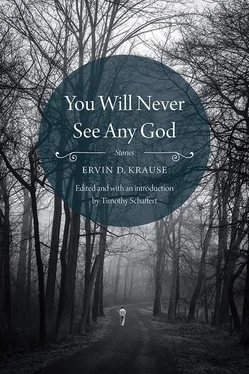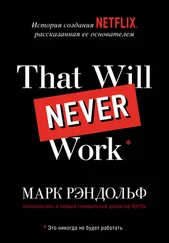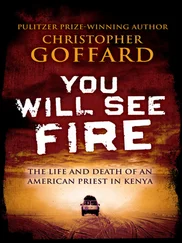He went out into the bitter cold, into the gray dirty night with the snow gray and ugly upon the cruel landscape. He huddled into his coat, feeling in his pocket the soft and crackly package with the gloves for Wanda, and he thought of returning and giving them to her, but he changed his mind, shook his head, said to himself, no, let it be as it is. He walked on, down the street where the houses huddled like cringing dogs against the cold, and he bent his head into the wind, walking toward the sore of light reflected above the center of the city.
It was early when he brought the tractor down the hill from the farmstead to cultivate the corn. The cultivator hung on the tractor like a spider, moving and jerking and groaning with the movements of the tractor. It was cool in the hollow by the ditch, and the heavy dew hung in silent and plastic rainbow-colored droplets from the willows and from the bayonetshaped corn leaves, and when the tractor raced through, the droplets shattered and rained on the tractor and on the blue denim legs of the man who was driving. The tractor went fast and the black earth curled up and turned like something alive before the cultivator shovels.
The ditch was broad and steep. It had been part of a pasture, but the man had plowed the fertile hill and put it in crops and then he had cut a few of the willows that grew in thicket-like profusion along the bank and had planted corn there too. There were still willows growing in the ditch and struggling along the edges of the bank. There was no water there except with heavy rains, and sometimes a puddle stood for days, hidden in weeds at the bottom of the ditch and hovered over by yellow butterflies.
The noise of the tractor was very loud in the hollow and the birds in the willows scattered when the tractor came by. The man turned at the end of the field and swung back into the corn and the shovels spun the earth up, loosening the earth and shaking it, and he worked near the edge of the bank, the large hind wheel of the tractor skirting the weed cover there.
The bank gave way almost soundlessly and leisurely far behind the tractor, and the earth slid quietly down into the ditch, and the moving crust of bank ate away and pursued the tractor. The man was looking forward and he did not see it eating away behind him, and he felt it finally, the escaping earth tugging at the wheel. He looked and saw the almost casual destruction below him and he swung the wheel of the tractor hard, away from the bank, but this gesture only assisted the moving earth, for it threw the weight on the outer wheel. The front of the tractor rose and the spider arms of the cultivator sprang into the air above the corn, and the bright steel shovels glittered, and then with the sigh of the escaping earth the tractor slid and rolled and fell. The man held the wheel and he tried to move with the roll of the tractor but the steel bars caught him and pulled him in and he was held there, vised in between the wheel and the earth in the ditch.
The sun was looking at him when he recovered consciousness. It was all he could see at first, the hard and insistent yellow eye probing him. And around the sun the sky was a polished and bright metal blue. It occurred to him that he was yet in bed and the sun was already up and he strove suddenly to move, and it was then he felt that other insistent scalpel touch in his legs, and he remembered. He lay on his side, and his right arm was twisted under him and his face was burrowed partially into the hard dry earth; his face had struck the pebbly wash of the ditch. His legs were beneath the wheel of the silent tractor; he felt a great numbness there, broken by flashing and gritty sharpness at intervals. He tried to fix the moments of sharpness and he discovered that they came whenever he breathed. When he held his breath the pain did not come at all, there was only the rather satisfying numbness.
He was aware of a gurgling sound nearby and he lifted his head with great effort and looked about him. The sound was from the gasoline tank slowly leaking the fuel. The gasoline dribbled out around the closed cap and streaked down the painted metal and made a little pool in the ditch, at the man’s elbow. The tank had been full, he thought, it would take a little while to empty, and he tried to think how long he had been there by the way the tank was emptying. There would be help soon, he thought, as soon as he was missed there would be help. He felt his overall bib for the pocket watch and he labored with the fob, dragging the watch out, but it was smashed. The hands had even been driven off, and the hands pointed nowhere from the bottom of the crushed crystal. The man looked dumbly at the watch, and he felt the smashed, still creased-together crystal, as if it were impossible that the watch could not run. The man squinted at the sun, and it too looked like a watch dial. The sun hung over his head, but it could not be noon, he thought, and he looked again and the sun was directly over him. If it is noon, they will surely miss him, he thought, and they will come searching for him, and this knowledge made him feel a little better. It was hot and the sweat streaked into his eyes and smarted, blinding him at moments and then all he could see was the blurred yellowness of the sun. There was great heat and the sun seemed to focus on him, the heat and the light white and hot and blinding, and he knew it was just his imagination, the sun was the sun and it was always hot and it did not choose to focus on anyone or anything. He would have loved that heat before, he thought, the sunlight that pulled the growing corn and fattened the growing animals, and warmly rubbed his shoulders when he was on the tractor. The sun did not choose him to burn, he thought, and yet it was too hot.
The sharpness in his legs was coming more quickly now, and it was rising, too, feeling up to his thighs, and he tried to recall the connection he had worked out before and he remembered his breathing. He was breathing very quickly and each time there was the sharp hurt, climbing from his legs to his hips, and he tried to slow his breathing, but he could not. The sun, it is too hot, he thought, and he remembered his hat, but the hat had fallen somewhere. He lifted his head and looked carefully and slowly about him. To lift his head caused him great pain. The straw hat rested against the foxtail beyond the wash, perhaps two yards from him. One end of it was tipped up and the hat swayed from time to time as little breezes eddied down the gulley. The man looked at the hat and he watched, straining his head and eyes to see it. The man did not feel any of the breezes that moved the hat, and it was as if the foxtail swayed of their own accord and thus swayed the hat with them. The man reached for the hat but it was far far beyond him.
The exertion wore upon him and he turned his head down again. The sun poured down. He felt the heat and he closed his eyes to rest. But there was another yellowness and he squinted and saw the sun very close to him and very bright and hot. It glittered and it moved and swayed delicately. The sun had moved, he thought, and he looked where the sun was supposed to be and it was still there. The other light was the sun reflected clearly from the shiny metal that the pouring gasoline had cleansed and he could not look anywhere now without the sun being there.
Perhaps he could dig, he thought, perhaps there was loose dirt beneath his legs and he could pull himself away to the shade. He reached along his body and touched the area where the pain was growing to and he felt the earth beneath his legs. It was hard and dry and pebbly there in the wash of the gulley. He dug there and even his hard, calloused hands could do nothing; he scratched at the ground and made a little hole that he could just put his hand into, after great exertion, but his hand was bleeding then and exhaustion came on him. He cursed to himself, he cursed the hard dry ground and he cursed the tractor with its weight upon him and he cursed the pain and the land and the hard yellow sun. He let his head drop upon the pebbly earth and the sun lavished its yellow heat upon him.
Читать дальше











